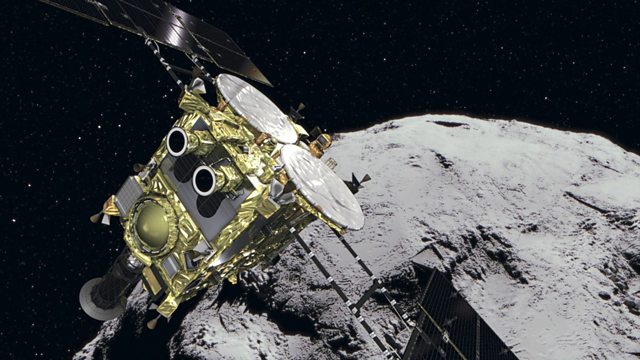
Japanese Space Mission
Hayabusa 2 mission; Cancer risk for flight crew; The Second Genome; Testosterone levels; AI and transport; Koala poop transplants.
The Japanese Space Agency’s mission to land on an asteroid, collect samples and return them to Earth has made its first approach. Currently looking for a landing site, the spacecracft is 20 km away from the rotating pile of space rocks. It is hoped that samples from the asteroid Ryugu will give us information about the formation of the early Solar System and whether asteroids like this, brought water to Earth. Roland Pease reports.
Higher Cancer Risk for US Flight Crew
The average flight attendant might well spend the equivalent of 120 working days in the sky each year. Now new research confirms that this much flying time could be a bigger risk to their health than previously thought. Dr Irina Mordukhovich, who is a Research Associate at the Harvard T. H. Chan School of Public Health compared American flight attendants with an equivalent subset of the US population. She spoke to Claudia Hammond.
The Second Genome
Are we on the cusp of a new approach to healthy living and treating disease? ���˿��� Health and Science correspondent James Gallagher explores the latest research into how our second genome, the vast and diverse array of microbes that live on and in our bodies, is driving our metabolism and our health. He speaks to two scientists who studied their microbiome by taking stool samples every day for a year; Lawrence David, assistant professor of molecular genetics and microbiology at Duke University and Eric Alm, co-director for the centre for microbiome infomatics and therapeutics at MIT, who analysed 548 of their own fecal samples.
Testosterone
People tend to associate high levels of testosterone with virility and manliness. In fact it is more about building up muscle mass and finding a mate. But testosterone levels do vary a lot, going up in competitive situations and down once men have children. Now new research suggests that what really matters is where you spent the first seven or eight years of their life, and that this can dictate testosterone levels in adulthood. Gillian Bentley, Professor of Anthropology at the University of Durham and senior author of the paper spoke to Claudia Hammond.
AI Summit
Katy Takatsuki reports from the AI Summit at London’s tech week where she’s been hearing how artificial intelligence – AI – is changing the face of transport.
From autonomous cars and car sharing apps, Uber has announced that ride-sharing will be coming to the skies – it’s been promising that for the last couple of years and says the idea will be piloted by 2020. Katy speaks to Uber’s chief scientist Professor Zoubin Ghahramani, and hears what car manufactures Volvo and BMW are doing in this field.
Poo Transplants Help Fussy Koalas
Faecal transplants in koalas are being tested to see if they can help the endangered animals change their diet from a less nutritious gum tree to a more nutritious gum tree. They say that by transferring faeces from the gut of one animal to another, they could boost the health and viability of endangered creatures. Notoriously fussy eaters, Koalas have been known to stop eating if they can’t get their preferred food. It’s hoped that the poo transplants will help them change their minds. Roland Pease speaks to Ben Moore, zoologist at Western Sydney University.
Picture: Hayabusa 2 will use a projectile to excavate fresh material from beneath Ryugu's surface, Credit: JAXA / Akihiro Ikeshita
The Science Hour was presented by Marnie Chesterton with comments from Bobbie Lakhera.
Last on
More episodes
Broadcast
- Sat 30 Jun 2018 11:06GMT���˿��� World Service Americas and the Caribbean
Podcast
-
![]()
Unexpected Elements
The news you know, the science you don't

